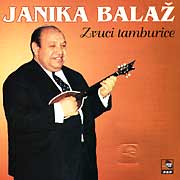Janika Balaž: Difference between revisions
m Romani |
LittleWink (talk | contribs) m Disambiguate Rác to Rác (surname) using popups |
||
| Line 7: | Line 7: | ||
[[File:Janika-Balazs Lukino.jpg|thumb|left|In house that stayed on this place in [[Lukino Selo]] is born Janika Balázs (or Balaž)]] |
[[File:Janika-Balazs Lukino.jpg|thumb|left|In house that stayed on this place in [[Lukino Selo]] is born Janika Balázs (or Balaž)]] |
||
He was born 1925 to a [[Hungarian language|Hungarian-speaking]] [[Romani people|Romani]] family with strong musical tradition. His father's surname was [[Rác]] (or Rácz), which was a Hungarian term for [[Serbs]] that was considered derogatory, so he took the mother's surname Balázs. He grew up in [[Bečej]], where he started playing [[violin]] in a local [[kafana]] with 10 years of age. When he realized that he couldn't become the best violinist, he switched to ("prim" or "bisernica") tamburitza which he played ever since. Later, he played with "Braća kozaci" band in the area of [[Subotica]] and [[Horgoš]]. From 1948 to 1951, he worked in [[Radio Crne Gore|Radio Titograd]] in [[SR Montenegro|Montenegro]], where he perfected his tamburitza play. |
He was born 1925 to a [[Hungarian language|Hungarian-speaking]] [[Romani people|Romani]] family with strong musical tradition. His father's surname was [[Rác (surname)|Rác]] (or Rácz), which was a Hungarian term for [[Serbs]] that was considered derogatory, so he took the mother's surname Balázs. He grew up in [[Bečej]], where he started playing [[violin]] in a local [[kafana]] with 10 years of age. When he realized that he couldn't become the best violinist, he switched to ("prim" or "bisernica") tamburitza which he played ever since. Later, he played with "Braća kozaci" band in the area of [[Subotica]] and [[Horgoš]]. From 1948 to 1951, he worked in [[Radio Crne Gore|Radio Titograd]] in [[SR Montenegro|Montenegro]], where he perfected his tamburitza play. |
||
From its foundation in 1951 to the end of his working career he worked in [[Radio Novi Sad]] and was a member of its Grand Tamburitza Orchestra. He was spending nights playing with his 8-men band in kafanas of Novi Sad, especially on [[Petrovaradin Fortress]], of which he became one of icons. During his career, he held concerts across the world, including 36 performances in [[Paris Olympia]]. Allegedly, he had several offers from [[United States]] and [[Soviet Union]] to move there and work as a tamburitza teacher, but he never wanted to leave Novi Sad, where he died in 1988. |
From its foundation in 1951 to the end of his working career he worked in [[Radio Novi Sad]] and was a member of its Grand Tamburitza Orchestra. He was spending nights playing with his 8-men band in kafanas of Novi Sad, especially on [[Petrovaradin Fortress]], of which he became one of icons. During his career, he held concerts across the world, including 36 performances in [[Paris Olympia]]. Allegedly, he had several offers from [[United States]] and [[Soviet Union]] to move there and work as a tamburitza teacher, but he never wanted to leave Novi Sad, where he died in 1988. |
||
Revision as of 19:13, 13 March 2012

Janika Balázs (Serbian, Croatian and Romani: Јаника Балаж or Janika Balaž; December 23, 1925 in Lukino Selo in Zrenjanin municipality – November 12, 1988 in Novi Sad) was a famous tamburitza musician and band leader from Vojvodina, Serbia.
Life


He was born 1925 to a Hungarian-speaking Romani family with strong musical tradition. His father's surname was Rác (or Rácz), which was a Hungarian term for Serbs that was considered derogatory, so he took the mother's surname Balázs. He grew up in Bečej, where he started playing violin in a local kafana with 10 years of age. When he realized that he couldn't become the best violinist, he switched to ("prim" or "bisernica") tamburitza which he played ever since. Later, he played with "Braća kozaci" band in the area of Subotica and Horgoš. From 1948 to 1951, he worked in Radio Titograd in Montenegro, where he perfected his tamburitza play.
From its foundation in 1951 to the end of his working career he worked in Radio Novi Sad and was a member of its Grand Tamburitza Orchestra. He was spending nights playing with his 8-men band in kafanas of Novi Sad, especially on Petrovaradin Fortress, of which he became one of icons. During his career, he held concerts across the world, including 36 performances in Paris Olympia. Allegedly, he had several offers from United States and Soviet Union to move there and work as a tamburitza teacher, but he never wanted to leave Novi Sad, where he died in 1988.
Janika participated in several documentary and feature films. Songs "Osam tamburaša s Petrovaradina" (Eight tambouritza-players from Petrovaradin) and "Primaši" were dedicated to him. During his career, he worked with many renowned musicians, including Zvonko Bogdan and Júlia Biszák.
After his death, the city of Novi Sad raised a monument (authored by sculptor Lászlo Szilágyi), standing on a square opposite the Petrovaradin fortress across the Danube.
Quote
- He has always been, in jazz speech, a band leader. Unification of orchestra's sound is something unique, something we could hear only at uncle Janika's. However, his solo parts are something unique, they had an emotion which is impossible to explain. Among thousands of tambouritzas, it was always easy to recognize the one of Janika Balaž.
Jovan Adamov, conductor of Radio Novi Sad dance orchestra
